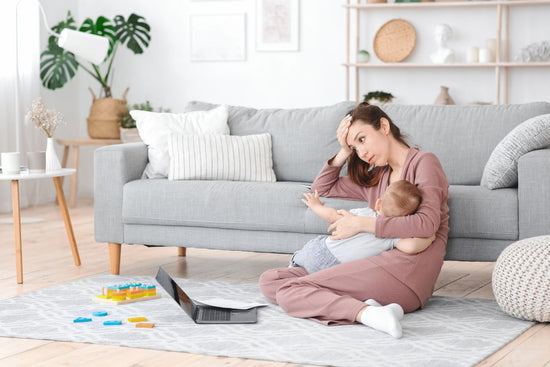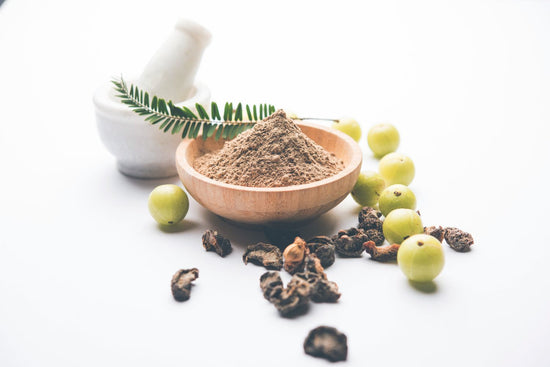Nine months can bring a baby to the world, but no amount of time can prepare new parents for how different their lives will be postpartum.
You know the first few weeks will be tough – and they are. But this was expected. You were prepared to be on your toes and you were excited about your new arrival. You probably had the most support at this time – family and friends were hovering around, and colleagues were respectful of your needs and new priorities.
Now fast forward to a few weeks or months later. This new reality has really started to sink in. Your daily routine and social life are completely different to what they were before you were pregnant, regardless of how much or how little support you have. Add to this the leftover complications you may have experienced during delivery… recovery from tears or stitches, excess weight that literally won’t leave your sides, the sudden drop in hormones to pre-pregnancy levels, hospital bills and any number of other issues. On top of this, there’s your baby. Your beautiful, burping, wailing, pooping baby who needs you so so much, all day and all night long. Every. Single. Day.
This new life is difficult.
You’ve probably had your fair share of bad moments. At some point, you may wonder (or you may know without a doubt) – are your moodiness and exhaustion signs of something deeper?
There has been a considerable amount of awareness around postpartum depression (PPD) in recent years, but it’s still quite a complex condition to understand. Part of the reason could be that PPD looks different for everyone.
What exactly is postpartum depression (PPD)?
What exactly is postpartum depression (PPD)?
The majority of new mothers feel overwhelmed, moody and anxious within the first two weeks postpartum – this is often referred to as a ‘baby blues.’ Postpartum depression typically develops after the first four weeks postpartum.
The list of symptoms feels an endless description of motherhood:
-
Mood swings
-
Fatigue / loss of energy
-
Sleeping too little or too much
-
Eating too little or too much
-
Insecurity about being a good mother
-
Insecurity about bonding with your baby
-
Fear of harming your baby
-
Anxiety
-
Lack of interest in activities you used to enjoy
But as the list continues, some symptoms may stand out as a bit more severe:
-
Excessive crying
-
Withdrawal from loved ones
-
Hopelessness
-
Feeling inadequate
-
Feeling that your baby would be better off under someone else’s care
-
Panic attacks
-
Feelings of being closed in physically
-
Reduced ability to function /carry out daily tasks
-
Reduced ability to care for your baby
If you feel these symptoms for more than two weeks and believe they are getting worse, or if you have thoughts about harming yourself or your baby, you may be experiencing PPD.
PPD shouldn’t be confused with postpartum psychosis - the most severe form of emotional upheaval postpartum, which is far more rare than PPD. Symptoms of postpartum psychosis include hallucination, delusions, paranoia and attempts to harm yourself and baby. If you believe you are experiencing this, seek medical help immediately.
For a comprehensive list of symptoms for baby blues, postpartum depression and postpartum psychosis, refer to this list by MayoClinic.

Did you know that 1 in 7 women experience postpartum depression?
One of the misconceptions about PPD is that it is rare. This could be because mothers don’t know they have it, or do know and choose not to reveal it for fear of being judged as a bad mother. The media’s fascination with postpartum psychosis might also have led to murky waters, creating confusion between PDD and the much more severe and rare postpartum psychosis.
In fact, PPD is fairly common and is experienced by around 15% of mothers (American Psychological Association).
Did you know there’s no known single cause for postpartum depression?
Did you know there’s no known single cause for postpartum depression?
Another misconception is the idea that PPD is somehow the fault of the mother. In fact, it’s a condition that is beyond control.
PPD can be onset by a variety of physical and emotional changes that take place postpartum. For some, it’s chemical – the sudden drop of estrogen and progesterone post delivery can wreak emotional havoc. For some, it’s genetic. For some, it’s lifestyle changes postpartum like sleep deprivation and lack of social support. For some it’s a lack of nutrients (such as B vitamins, vitamin D and trace minerals). For others, it’s past episodes of anxiety or depression.
Anecdotally speaking, for some it can be a result of real world trauma like a car accident. As an example, a friend of mine was seriously injured and unable to carry her baby for nearly a year, triggering severe PPD.
With such a diverse range of potential causes, that can very well overlap, it’s unfathomable to think that PPD is within one’s control.
Did you know that postpartum depression can appear at any time in the first two years postpartum?
Did you know that postpartum depression can appear at any time in the first two years postpartum?
Did you know postpartum depression is treatable?
Did you know postpartum depression is treatable?
Did you know that it can take a considerable amount of time to recover from postpartum depression?
Did you know that it can take a considerable amount of time to recover from postpartum depression?

Did you know that PPD can affect fathers as well?
Did you know that PPD can affect fathers as well?
Parenthood can be overwhelming for new fathers too; they certainly experience the disruptions to routine, sleep cycles and emotions that moms go through. So it shouldn’t be too surprising that some fathers report feeling depressed.
Though the studies on the subject are still sparse, or based on small population sets, some studies estimate that up to 25% of dads may experience symptoms of depression in the first two months postpartum.
Personally, I was surprised when my husband brought this up in conversation, but it does make sense. New fathers tend to have less social outlets to talk about the emotions of becoming a parent and in several ways, less social support than mothers do.
The good news for dads is that their PPD is treatable as well, with similar treatment options available.
No matter how hard it is to believe, there is a light at the end of the tunnel.
If you think you are experiencing PPD, remember that you are not alone. There are other parents who have experienced what you have and have gotten through it. If you are looking for local treatment, this comprehensive list of treatment programs and specialists by Postpartum Progress is a good place to start.
Whether or not you are experiencing PPD, remember to be kind to other parents. A stray comment can be interpreted in so many ways and cause so much anxiety – even when unintended. Perhaps the best support you can offer to new parents around you is a patient ear to help them feel less alone.
A big part of noticing PPD is being aware of its symptoms and misconceptions. If you found this article helpful, I hope you share it with everyone you can. We never know who we may help out just that little bit.
Posted by Nidhi Chimnani
Nidhi is a fresh mom who has lived in over 8 countries and has experienced several cultures closely. She was editor-in-chief of an established magazine for several years. She currently lives in Dubai and writes a blog about her experience with baby stuff. See her blog here.





